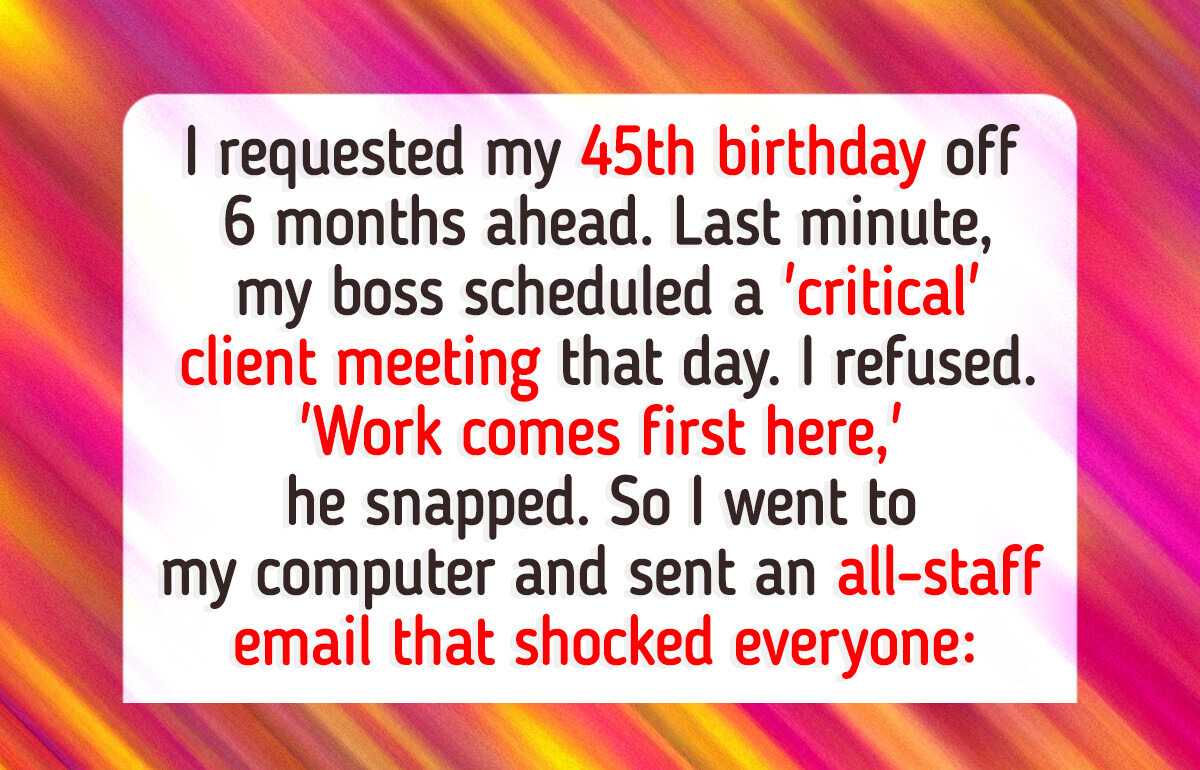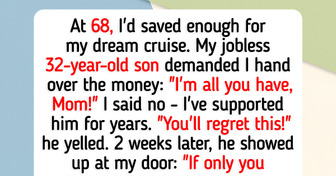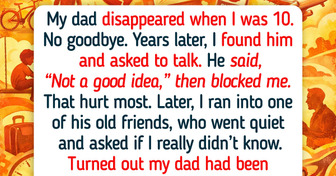Know your worth.
My Boss Demanded I Skip My Special Day — He Wasn’t Ready for What Came Next

We’ve all fantasized about telling our boss exactly what we think when they try to guilt-trip us out of using our own vacation days. You know the drill — you request time off months ahead, get approval, then suddenly your personal plans become “inconvenient” for the company. They use phrases like “dedication” and “team player” to make you feel bad for wanting a life outside of work. One day, you realize you’re tired of apologizing for having boundaries, and that’s when things get interesting.
The letter we received:
Hi Bright Side,
I booked my 45th birthday off six months ahead of time and got written approval from my boss. Last minute, he scheduled an “urgent” client meeting that day and expected me to cancel my plans. I refused, citing my pre-approved time off and family plans that couldn’t be moved. “Work comes first here,” he said coldly.
That comment made my blood boil. I’ve been working at this company for eight years, rarely taking sick days, often staying late, and never complaining about extra responsibilities. But apparently wanting one day off for my birthday makes me a bad employee. I was tired of being treated like my personal time was worthless and my family commitments didn’t matter.
So I sent a company-wide email that I’d been thinking about for months: “After 8 years of dedicated service, I’m announcing my resignation effective immediately. I’ve realized that a workplace that considers approved vacation days ’optional’ and family time ’negotiable’ isn’t where I want to spend the rest of my career. To my amazing colleagues — you deserve better than this too. To management — I hope you find someone who’s willing to give up their entire life for a company that doesn’t respect basic boundaries.”
Within an hour, I had messages from coworkers thanking me for saying what they’d all been thinking. Three people put in their two weeks’ notice that same day. By the end of the week, our biggest client had heard about the mass resignations and was questioning whether our company could handle their account properly. Now my former boss is panicking about losing the contract that made my birthday meeting so “urgent” in the first place.
I feel vindicated but also nervous about finding a new job at 45. Some friends think I was too dramatic, while others say I did what needed to be done. Was I right to burn bridges like that, or should I have handled it differently?
Sincerely,
Cheryl P.
Cheryl, we completely understand your frustration and don’t blame you for reaching your breaking point after years of having your boundaries ignored. While the situation got intense quickly, you clearly touched a nerve that resonated with your coworkers too. We hope our advice helps you feel confident about your decision and move forward positively.

I just wouldn't have come in. Then filed for unemployment. Instead you went nuclear and now might be out of work over a bday.
Set clear expectations about approved time off from the beginning. When you request vacation days, make sure you get written confirmation and clarify that these dates are non-negotiable except for true emergencies. Don’t just assume your boss understands that approved time off means you won’t be available. Having these conversations upfront prevents last-minute guilt trips and shows you take your personal time seriously. If they can’t respect approved vacation days, that tells you everything about the company culture.
Don’t justify your personal plans to demanding bosses. You don’t need to explain why your time off is important or prove that your family plans are worthy of respect. Simply stating “I have prior commitments that day” should be enough for any reasonable manager. The moment you start explaining your birthday plans or family obligations, you’re opening the door for them to judge whether your reasons are “good enough.” Your approved time off doesn’t require their personal approval of your activities.
Practice saying no without feeling guilty about it. Your boss’s “work comes first” comment was designed to make you feel bad for having boundaries, but that’s a manipulation tactic, not a valid business principle. Good companies understand that employees with healthy work-life balance are more productive and loyal long-term. Don’t let anyone make you feel selfish for protecting your mental health and personal relationships.
Research company culture before accepting future positions. Ask interview questions about how they handle work-life balance, what their vacation policies look like in practice, and how they respond when business needs conflict with approved time off. Pay attention to how current employees talk about their personal time and whether managers seem to respect boundaries. Red flags in interviews can save you from repeating this situation at your next job.
We’ve all had that one boss who thought they owned our entire lives until reality hit them hard. What’s your most beautiful “toxic manager gets what’s coming to them” story — spill it below!
And while you’re here, don’t miss this powerful story from our reader: “I was told my mom abandoned me at birth. My adoptive parents ‘saved’ me. At 25, I did a DNA test and matched with my sister. ‘Mom didn’t leave,’ she said, confused. ‘She sees you every single day.’ Imagine my horror when I realized my mom was actually...” Click 👉 here to read what happened next.
Comments
Related Reads
I Refuse to Sacrifice My Retirement Dream for My Unemployed Son

14 Moments Kindness Won Even When Life Was Cruel

I Refused to Pay for Our Valentine’s Dinner—Then I Learned the Heartbreaking Truth

I Refused to Talk to My Parents After They Chose My Ex-Wife Over Me

10 Dating Stories That Started Like Rom-Coms but Ended Like Horror Movies

10 Moments That Show Kindness Doing the Heavy Lifting

I Gave Up My 2-Month-Old Baby for Adoption Because I Chose My Own Happiness

12 Small Acts of Kindness That Quietly Changed Lives

14 Stories From Cleaners That Are Wilder Than Any Movie Script

11 People Whose Quiet Compassion Saved Their Broken Families

My Family Excluded My Girlfriend From Christmas Because We’re Not Married

12 Stories That Capture the Sweet and Sour Memories of Blended Families


